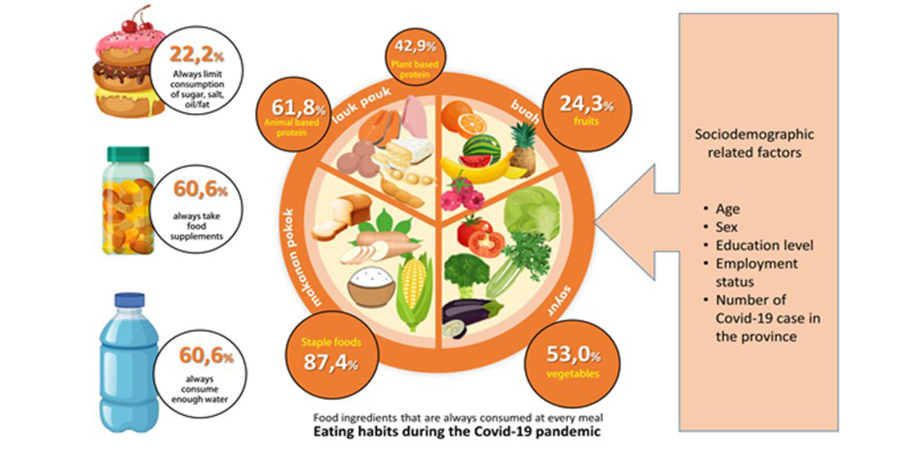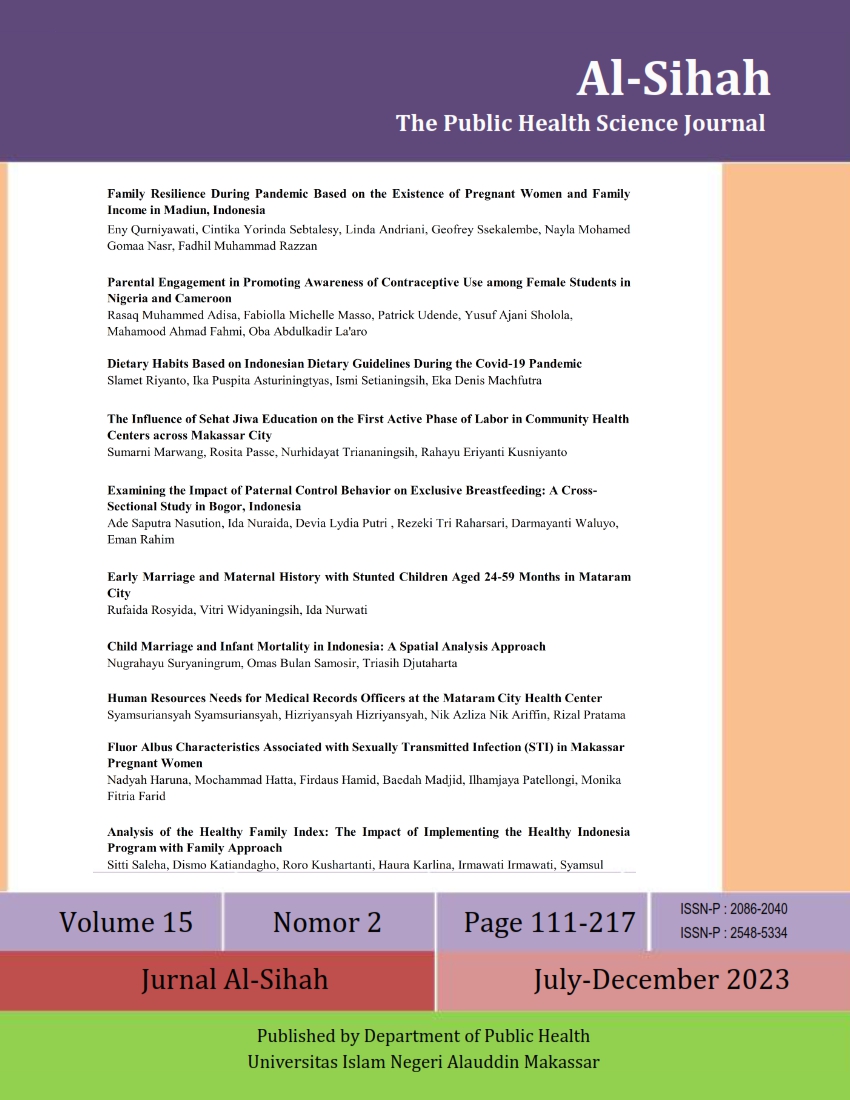Dietary Habits Based on Indonesian Dietary Guidelines During the Covid-19 Pandemic
Abstract
Decreased immunity is a risk factor for viral respiratory infections, underscoring the crucial role of balanced diets to support the immune system. Therefore, this study aimed to determine the eating habits of people in the location based on balanced nutrition guidelines during the Covid-19 pandemic. A cross-sectional design was used and the samples included 3394 respondents who met the criteria of being ≥15 years old and living in the provinces of Central Java, East Java, Riau, and Southeast Sulawesi. Data were collected using a Google form-based online questionnaire filled out independently by respondents. The gathered data comprised compliance with balanced nutrition recommendations for consuming staples, protein-rich foods, fruits, vegetables, water, salt, sugar, and oil. In addition, diet was also observed based on several sociodemographic variables. The results showed that during the Covid-19 pandemic, 75.7% of respondents had not fulfilled intake according to balanced nutrition advice due to insufficient fruit consumption. However, about 60.6% consistently used dietary supplements, and 77.8% did not limit salt, sugar, as well as oil intake. The population at more risk of inadequate nutrition included younger age groups, males, those with low education, unemployed, and living in areas with high Covid-19 cases. This study concluded that during the Covid-19 pandemic, many Indonesians did not implement a diet based on the principles of balanced nutrition. Therefore, education on the importance of balanced nutrition consumption, local food campaigns, cheap markets, and food aid was needed, specifically for rarely consumed diets such as fruit, by targeting the most vulnerable groups.

Downloads
References
Ammar, A., Brach, M., Trabelsi, K., Chtourou, H., Boukhris, O., Masmoudi, L., Bouaziz, B., Bentlage, E., How, D., Ahmed, M., Müller, P., Müller, N., Aloui, A., & Hammouda, O. (2020). Effects of COVID-19 Home Confinement on Eating Behaviour and Physical Activity : Results of the. Nutrients, 12(1583), 13.
Badan Penelitian dan Pengembangan Kesehatan. (2014). Studi Diet Total : Survei Konsumsi Makanan Individu (D. K. Trihono, Atmarita, Abas Basuni Jahari (ed.); Cetakan Pe). Lembaga Penerbitan Badan Penelitian dan Pengembangan Kesehatan. https://doi.org/10.1063/1.3059570
Bel, S., De Ridder, K. A. A., Lebacq, T., Ost, C., Teppers, E., & Cuypers, K. (2019). Habitual food consumption of the Belgian population in 2014-2015 and adherence to food-based dietary guidelines. Arch Public Heal, 77(14), 1–15. https://doi.org/10.1186/s13690-019-0343-3
Desbouys, L., De Ridder, K., Rouche, M., & Castetbon, K. (2019). Food consumption in adolescents and young adults: Age-specific socio-economic and cultural disparities (Belgian Food Consumption Survey 2014. Nutrients [Internet, 11(1520), 1–15. https://doi.org/doi:10.3390/nu1107152
Djalante, R., Lassa, J., Setiamarga, D., Sudjatma, A., Indrawan, M., Haryanto, B., Mahfud, C., Sinapoy, M. S., Djalante, S., Rafliana, I., Gunawan, L. A., Surtiari, G. A. K., & Warsilah, H. (2020). Review and analysis of current responses to COVID-19 in Indonesia: Period of January to March 2020. Progress in Disaster Science, 6, 100091. https://doi.org/10.1016/j.pdisas.2020.100091
EUFIC. (2020). Food and coronavirus (COVID-19): What You Need To Know. European Food Information Council (EUFIC). EUFIC. https://www.eufic.org/en/food-safety/article/food-and-coronavirus-covid-19-what-you-need-to-know . Updated March 26, 2020.
Florentino, R., Tee, E., Hardinsyah, R., Ismail, M., Suthutvoravut, U., & Hop, L. (2016). Food-Bases Dietary Guidelines of Southeast Asian Countries: Part 2-Analysisi of Pictorial Guides. Mal J Nutr, 22(supplement), S49-65.
Frank, S. M., Webster, J., McKenzie, B., Geldsetzer, P., Manne-Goehler, J., Andall-Brereton, G., Houehanou, C., Houinato, D., Gurung, M. S., Bicaba, B. W., McClure, R. W., Supiyev, A., Zhumadilov, Z., Stokes, A., Labadarios, D., Sibai, A. M., Norov, B., Aryal, K. K., Karki, K. B., … Jaacks, L. M. (2019). Consumption of fruits and vegetables among individuals 15 years and older in 28 low- And middle-income countries. Journal of Nutrition, 149(7), 1252–1259. https://doi.org/10.1093/jn/nxz040
Gibson, A., Edgar, J. D., Neville, C. E., Gilchrist, S. E. C. M., McKinley, M. C., Patterson, C. C., Young, I. S., & Woodside, J. V. (2012). Effect of fruit and vegetable consumption on immune function in older people: A randomized controlled trial. American Journal of Clinical Nutrition, 96(6), 1429–1436. https://doi.org/10.3945/ajcn.112.039057
Grech, A., Sui, Z., Siu, H., Zheng, M., Allman-Farinelli, M., & Rangan, A. (2017). Socio-Demographic Determinants of Diet Quality in Australian Adults Using the Validated Healthy Eating Index for Australian Adults (HEIFA-2013. Healthcare [Internet, 5(7), 1–12. https://doi.org/doi:10.3390/healthcare5010007
Hamulka, J, Jeruszka-Bielak, M., Górnicka, M., Drywień, M. E., & Zielinska-Pukos, M. A. (2021). Dietary supplements during covid-19 outbreak. Results of google trends analysis supported by plifecovid-19 online studies. Nutrients, 13(1), 1–17.
Hanbazaza, M. A., & Mumena, W. A. (2020). Knowledge and practices related to salt intake among saudi adults. Int J Environ Res Public Health, 17(16), 1–10.
Horswill, C. A., & Janas, L. M. (2011). Hydration and Health. American Journal of Lifestyle Medicine, 5(4), 304–315. https://doi.org/10.1177/1559827610392707
Im, J. H., Je, Y. S., Baek, J., Chung, M. H., Kwon, H. Y., & Lee, J. S. (2020). Nutritional status of patients with COVID-19. International Journal of Infectious Diseases, 100, 390–393. https://doi.org/10.1016/j.ijid.2020.08.018
Ismail, L. C., Osaili, T. M., Mohamad, M. N., Al, M. A., Jarrar, A. H., & Jamous, D. O. A. (2020). Eating habits and lifestyle during covid-19 lockdown in the united arab emirates: A cross-sectional study. Nutrients, 12(11), 1–20.
James, P. T., Ali, Z., Armitage, A. E., Bonell, A., Cerami, C., Drakesmith, H., Jobe, M., Jones, K. S., Liew, Z., Moore, S. E., Morales-Berstein, F., Nabwera, H. M., Nadjm, B., Pasricha, S. R., Scheelbeek, P., Silver, M. J., Teh, M. R., & Prentice, A. M. (2021). The Role of Nutrition in COVID-19 Susceptibility and Severity of Disease: A Systematic Review. Journal of Nutrition, 151(7), 1854–1878. https://doi.org/10.1093/jn/nxab059
Kamarli Altun, H., Karacil Ermumcu, M. S., & Seremet Kurklu, N. (2021). Evaluation of dietary supplement, functional food and herbal medicine use by dietitians during the COVID-19 pandemic. Public Health Nutrition, 24(5), 861–869. https://doi.org/10.1017/S1368980020005297
Karim, N., Epi, M. C., Zaman, M. M., Rahman, M., Chowdhury, M. A. J., Ahsan, H. A. M. N., Hassan, M. M., Karim, S. R., Hossain, M. Z., & Billah, B. (2017). Sociodemographic Determinants of Low Fruit and Vegetable Consumption Among Bangladeshi Adults : Results From WHO- STEPS Survey 2010. Asia Pacific Journal of Public Health, 29(3), 189–198. https://doi.org/10.1177/1010539517699059.Sociodemographic
Kemenkes RI. (2020). Situasi Terkini Perkembangan (COVID-19). In Kementerian Kesehatan Republik Indonesia (Issue 30 Juli). https://covid19.kemkes.go.id/download/Situasi_Terkini_050520.pdf
Kementerian Kesehatan RI. (2019). Laporan Nasional Riskesdas 2018. Lembaga Penerbit Badan Penelitian dan Pengembangan Kesehatan.
Kementerian Kesehatan RI. (2020). Panduan Gizi Seimbang Pada Masa Pandemi Covid-19. Kementerian Kesehatan RI.
Kwon, D. H., Park, H. A., Cho, Y. G., Kim, K. W., & Kim, N. H. (2020). Different associations of socioeconomic status on protein intake in the Korean elderly population: A cross-sectional analysis of the Korea National Health and Nutrition Examination Survey. Nutrients, 12(1). https://doi.org/10.3390/nu12010010
Livingstone, K. M., Olstad, D. L., Leech, R. M., Ball, K., Meertens, B., Potter, J., Cleanthous, X., Reynolds, R., & McNaughton, S. A. (2017). Socioeconomic inequities in diet quality and nutrient intakes among Australian adults: Findings from a nationally representative cross-sectional study. Nutrients, 9(10). https://doi.org/10.3390/nu9101092
Lotfi, M., Hamblin, M. R., & Rezaei, N. (2020). COVID-19: Transmission, prevention, and potential therapeutic opportunities. Clinica Chimica Acta Journal, 508(2020), 254–266. https://doi.org/https://doi.org/10.1016/j.cca.2020.05.044
Méjean, C., Si Hassen, W., Lecossais, C., Allès, B., Péneau, S., & Hercberg, S. (2016). Socio-economic indicators are independently associated with intake of animal foods in French adults. Public Health Nutr, 19(17), 3146–3157. https://doi.org/10.1017/S1368980016001610
Miller, V., Yusuf, S., Chow, C. K., Dehghan, M., Corsi, D. J., Lock, K., Popkin, B., Rangarajan, S., Khatib, R., Lear, S. A., Mony, P., Kaur, M., Mohan, V., Vijayakumar, K., Gupta, R., Kruger, A., Tsolekile, L., Mohammadifard, N., Rahman, O., … Mente, A. (2016). Availability, affordability, and consumption of fruits and vegetables in 18 countries across income levels: findings from the Prospective Urban Rural Epidemiology (PURE) study. The Lancet Global Health, 4(10), e695–e703. https://doi.org/10.1016/S2214-109X(16)30186-3
Moradi-Lakeh, M., El Bcheraoui, C., Afshin, A., Daoud, F., Almazroa, M. A., Al Saeedi, M., Basulaiman, M., Memish, Z. A., Al Rabeeah, A. A., & Mokdad, A. H. (2017). Diet in Saudi Arabia: Findings from a nationally representative survey. Public Health Nutrition, 20(6), 1075–1081. https://doi.org/10.1017/S1368980016003141
Park, S., Thompson, F. E., McGuire, L. C., Pan, L., Galuska, D. A., & Blanck, H. M. (2018). Sociodemographic and Behavioral Factors Associated with Added Sugars Intake among US Adults Sohyun. Physiology & Behavior, 176(5), 139–148. https://doi.org/10.4049/jimmunol.1801473.The
Phulkerd, S., Thapsuwan, S., Thongcharoenchupong, N., Soottipong Gray, R., & Chamratrithirong, A. (2020). Sociodemographic differences affecting insufficient fruit and vegetable intake: a population-based household survey of Thai people. J Heal Res, 34(5), 419–429. https://doi.org/10.1108/JHR-07-2019-0150
Poobalan, A. S., Aucott, L. S., Clarke, A., & Smith, W. C. S. (2014). Diet behaviour among young people in transition to adulthood (18–25 year olds): a mixed method study. Heal Psychol Behav Med, 2(1), 909–928. https://pubmed.ncbi.nlm.nih.gov/25750826/
Riyanto, S., P Asturiningtyas, I., Setianingsih, I., Nur’aini, N., Zainuddin, Z., Purwoko, S., Prihatin, A., & Mirzautika, A. (2021). Healthy lifestyles during the COVID-19 new normal era in Indonesia. Annals of Tropical Medicine & Public Health, 24(01). https://doi.org/10.36295/asro.2021.24174
Si Hassen, W., Castetbon, K., Cardon, P., Enaux, C., Nicolaou, M., Lien, N., Terragni, L., Holdsworth, M., Stronks, K., Hercberg, S., & Méjean, C. (2016). Socioeconomic indicators are independently associated with nutrient intake in French adults: A DEDIPAC study. Nutrients, 8(3). https://doi.org/10.3390/nu8030158
Sidor, A., & Rzymski, P. (2020). Dietary choices and habits during COVID-19 lockdown: Experience from Poland. Nutrients, 12(6), 1–13. https://doi.org/10.3390/nu12061657
Sirico, F., Miressi, S., Castaldo, C., Spera, R., Montagnani, S., Di Meglio, F., & Nurzynska, D. (2018). Habits and beliefs related to food supplements: Results of a survey among Italian students of different education fields and levels. PLoS ONE, 13(1), 1–11. https://doi.org/10.1371/journal.pone.0191424
Stookey, J. D., Allu, P. K. R., Chabas, D., Pearce, D., & Lang, F. (2020). Hypotheses about sub-optimal hydration in the weeks before coronavirus disease (COVID-19) as a risk factor for dying from COVID-19. Medical Hypotheses Journal, 144(110237), 1–10. https://doi.org/https://doi.org/10.1016/j.mehy.2020.110237
Thorpe, M. G., Milte, C. M., Crawford, D., & McNaughton, S. A. (2016). A comparison of the dietary patterns derived by principal component analysis and cluster analysis in older Australians. Int J Behav Nutr Phys Act [Internet, 13(1), 30. http://www.ijbnpa.org/content/13/1/30
World Health Organization. (2020). Coronavirus Disease (COVID-19) Situation Report - 193 (Issue July). https://www.worldometers.info/coronavirus/
Zhang, F. F., Barr, S. I., McNulty, H., Li, D., & Blumberg, J. B. (2020). Health effects of vitamin and mineral supplements. The BMJ, 369. https://doi.org/10.1136/bmj.m2511
Copyright (c) 2023 Slamet Riyanto, Ika Puspita Asturiningtyas, Ismi Setianingsih, Eka Denis Machfutra

This work is licensed under a Creative Commons Attribution-NonCommercial-ShareAlike 4.0 International License.
Authors retain copyright and grant the journal right of first publication with the work simultaneously licensed under a Creative Commons Attribution-NonCommercial-ShareAlike 4.0 International License that allows others to share the work with an acknowledgment of the work's authorship and initial publication in this journal.
Authors are able to enter into separate, additional contractual arrangements for the non-exclusive distribution of the journal's published version of the work (e.g., post it to an institutional repository or publish it in a book), with an acknowledgment of its initial publication in this journal.
Authors are permitted to publish their work online in third parties as it can lead to wider dissemination of the work.






